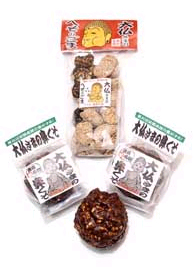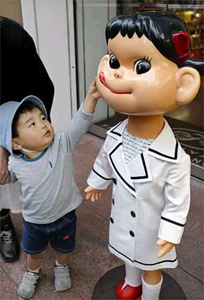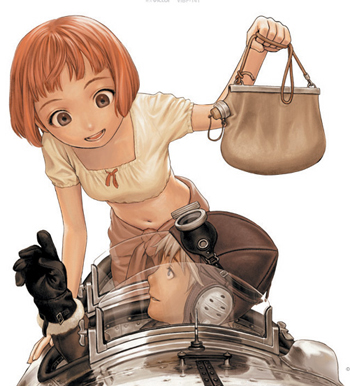

Coffee or music: which is the true universal language?
Of course, it's coffee-flavored milk depicted in the photograph — but still. Butterflies, flutter-bys, tiny Tokyo, GT vixens and Shinto nuptials in this week's invitation to Japan to come on over and share.

Busy — like I told you. I have a few responsibilities tonight but in spite of that and the temporary slow of news, some blogging could appear before long. In the meantime, head over to the Mainichi Shimbun for Venus tourist-traps, the many moods of Sumo and cherry-picking as a law enforcement duty.

Above is a Noh theater mask. Four-and-a-half years ago I read some pieces of an article in Rolling Stone on a costumed metal band whose members' shock value did much to make up for their unmusicality. The vocalist wore a sort of Leatherface mask but insisted that it was from "Japanese Kabuki. My mother used to wear it, hide behind doors and scare me." Set aside the statute-limited tale of abuse. Kabuki? The next day I happened to be at the library and zeroed in on the Japanese culture shelf, going home with an armful of textbooks and picture books on Kabuki. It turns out that Kabuki, a theatrical art form begun in the 16th Century, is primarily identified by the absence of masks used in costumery. Go figure — one man's phony story was another's introduction to Japanese culture at its most venerable, intriguing and esoteric.
Dandy actors on the red carpet, full-body tattoos, May flowers, the Japanese subsidiary for Ricola and more in this week's broadcast of the free world's most thankfully worst-kept secret.
Our first stop in Japan takes us to a growing scandal in the august and deliberative bodies of the Diet that threatens to tear apart the delicate balance of civil legislation:
Japanese Prime Minister Junichiro Koizumi scolded rookie lawmakers Thursday for reading comic books and talking on their cell phones during legislative sessions, according to a newspaper report. The national Asahi newspaper said Koizumi scolded 30 first-term lawmakers from his Liberal Democratic Party during a luncheon."Don't send e-mail on your cell phones or read comic books in Parliament while in session," Koizumi was quoted as saying.
We can better understand why the Japanese people have believed for decades that politics is sequestered from their world, indeed "the game across the street." No word on the names of superheroes whose exploits these remiss MPs were indulging in.
Skylarking greenhorns aside, Japan's power, influence, confidence and sense of moral responsibility continues to grow — and the world is beginning to take notice. The Asia Times has reviewed a book recently published by author John Nathan on Japan's broadening horizons and growing pains alike. Some of those pains include Japan's often cartoonishly brazen advertising at the expense of thin-skinned special interests. Take, for example, Great Buddha Boogers:
| One of Japan's most famous Buddhist temples is up in arms over a company's sale of sweets it calls "Great Buddha Boogers," the Mainichi has learned. Buddhist priests at Todaiji Temple in the ancient capital of Nara got snotty over the sweets, which come in a package featuring a picture of Buddha picking his nose. They successfully stopped a Nara Prefecture company from continuing to use the controversial title as a trademark by successfully arguing that it offended believers. |  |
Never a richer, more unpredictable place. Also on the Mainichi Shimbun is this week's Photojournal, with a Japanese volleyball win, a cell phone designed for easier misplacement, Sony's nod to music as binary property and a serenade in East Timor.
Because Japanese newspapers spent most of the month of April crisscrossed with redundant reports, commentary and photography on the Wahabbist-Khomeinist-Ba'athist disruption in Iraq — including the chalkboard-raking spectacle of family members of so-called "human rights activists" and random protesters blaming the Allies for the kidnappings and violence of the very thugs whom said activists indirectly absolved in their crusade to keep Iraq dangerous, poor and undemocratic — the Mainichi Shimbun's Photojoural pages have been below uBlog standards. Now that the weeks of handwringing have passed, the general public is again treated to slices of life on the greatest island democracy that almost never was.

This is Peko-Chan, trademark for the Fujiya Confectionery Company; and as streetcorner mascot a prime candidate for highly portable, collectable kitsch. Her kidnappings are a sort of urban tradition. Elias Brothers, know that you are not alone. (Or for that matter, Big Boy. Hey, Peko, do I know a fella for you. Hardworking. Good cook. Er, what do you think of pompadours? )

Yes, it's been some time since my last look into our unique capitalist friends across the Pacific — of course, Japan is never not interesting, so you can pop over to the Mainichi and be amazed and astounded any time. Today, we go maritime. When Leiji Matsumoto isn't blazing a masterful trail for Manga and animé, he's apparently inspiring 114-ton ferry boats for use in Japan's metropolitan waterways. The Japanese are no strangers to adding a science-fiction twist to ordinary life but the Himiko, which begins service today, is a pure act of eliminating every last bit of non-stylishness to the country. After one look at this metal, winsome beauty, can you blame them?
Political steps taken over the past several months by the Japanese to bolster their military and strengthen their diplomatic resolve - not to mention the recent court decision to hang cult killer Shoko Asahara - have convinced me that the country is moving inexorably towards confident international stature and sensible domestic polity. Moving inexorably if slowly, that is.

Yes, ladies and gents, that's ""Nippon Seaman Ship, Seaman Ship, For Love...For Peace." The marketing division responsible for this call to arms (outstretched, gaily, while twirling) was convinced that peace through strength of arms could be promoted with levity. And, from the looks of the photograph, superb dance choreography. Has the same advertising agency been working on a public image boost to the Young Men's Shinto Association? This week's Photo Journal doesn't say, but offers insight on 360-degree realtime imaging, paper mâché rhinos, digital snappers and tennis players indulging in tiaras while overseas. Take a look.

My buddy Ed ought to be a Japanimation salesman. He's hooked me, a non-enthusiast, to his latest find: Last Exile. What could possibly be better than an animé series devoted to the soap opera of charismatic teenagers battling in repulsor-driven airships from a would-be 1920s? Said animé series that, without your even watching it, lends itself to ColdPlay's hit "Clocks." Can you hear it? Send a memo to the marketing department.

In the West, beautiful, lithe women are made to be models and paraded around in all manner of revealing attire. In Japan, beautiful, lithe women are made to be models and stuffed into coffin-sized, dry-cell-battery-powered, rolling lozenges. I'd end this with a platitude like "You can't account for taste" but you know, they're really stretching it.
On the serious side, the Mainichi Daily News has collected two heartwarming photographs depicting the first Japanese deployment since the Second World War, and we can see a Japan worlds apart from the one the Allies defeated and rebuilt:


Back to Japan, land of unique tastes. Cherry blossoms, Prime Minister Junichiro as a Bronx Bomber and reckless chocolate abandon on the other side of this link.
GET 'EM WHILE THEY LAST: As I noted a couple weeks ago, the Mainichi culls independently produced photographs for its PhotoJournal series, and I could not find archives from a given week as I could with Photo Specials. Having traded correspondence with an editor, I now know for sure that the Mainichi does not keep PhotoJournal archives; so whatever is online this week will soon be relegated to either the flotsam of pool photography or obscure, cherry-picking bulletin boards. Understanding that full credit would be given, I'm contemplating archiving each week's photos myself. We'll see.
As a child I used to read a Japanese mythology-inspired book, The Dream Eater, but this is entirely something else:
[Takara's] Yumemi Koubou works by first relaxing you; lulling you to sleep with soft background music, mood lights, and a "pleasing" fragrance. Once the mood has been set, it's your turn to respond. To solidify the dream content, according to Takara, you need to record one simple, concise summary phrase with the built-in recorder. Make it a good one - this phrase will be repeated throughout the night quietly while you're sleeping.With knowledge of a standard eight-hour sleep schedule, the device activates periodically during your REM sleep cycles, giving gentle reminders of the desired dream content (in other words, more music, fragrance, and replaying your recorded phrase).
In a written statement, a representative from Takara states, "… this product is designed to help people shape their dreams in sleep, combining multi-sensory stimulus and sophisticated sleep-dream research to create an environment conducive to having a specific dream desired by the user."
A repeated phrase, eh? If this were scientifically sound, the phrase could be theraputic - or used for indoctrination. That reminds me of an old instructional tape used to maximum ironic effect on MTV's early 1990s Liquid Television: "You love to bowl. You love to bowl. You love..." The Yumemi Koubou's worth at least half a gander, especially since Takara are the same people who brought us the Bow-Lingual dog translator.
